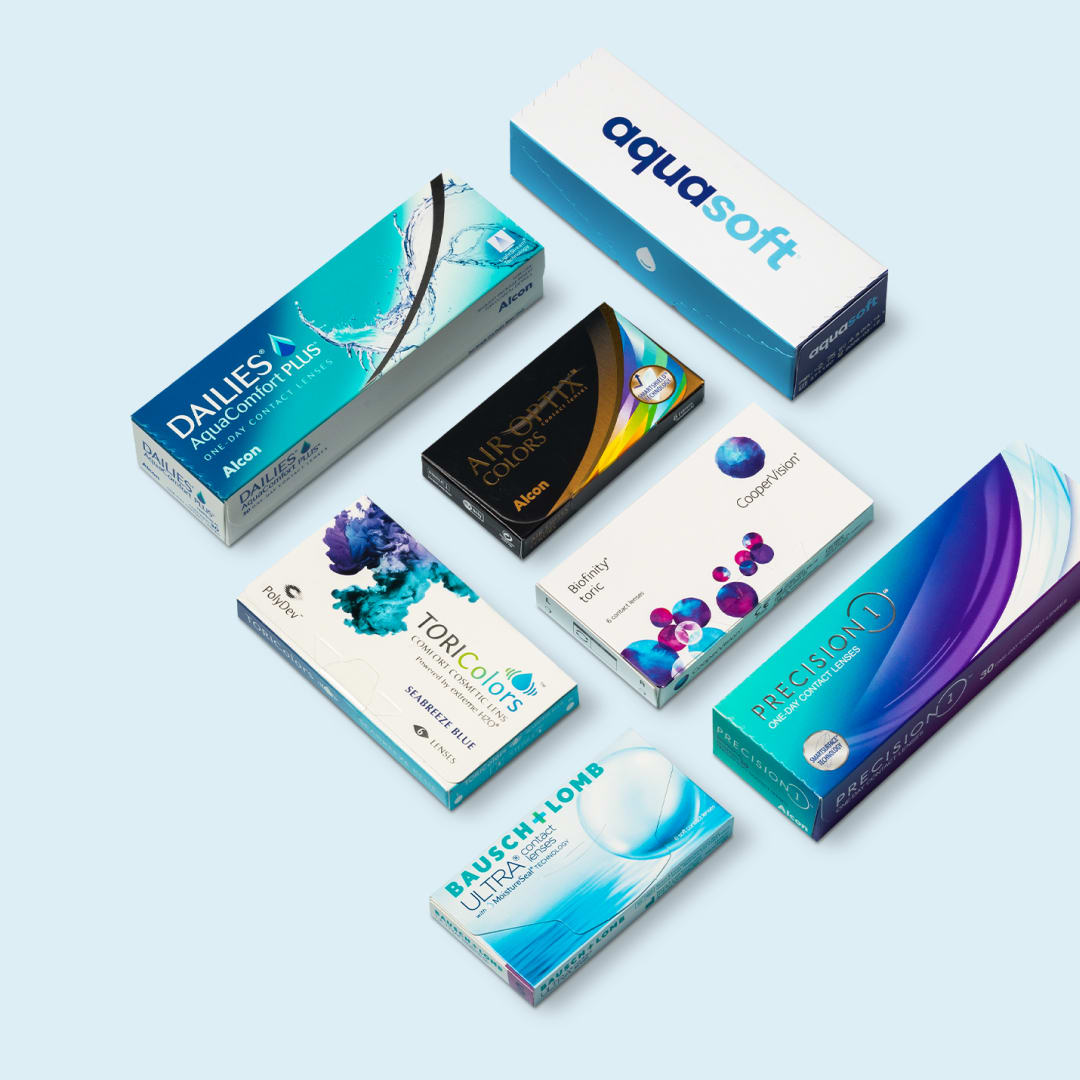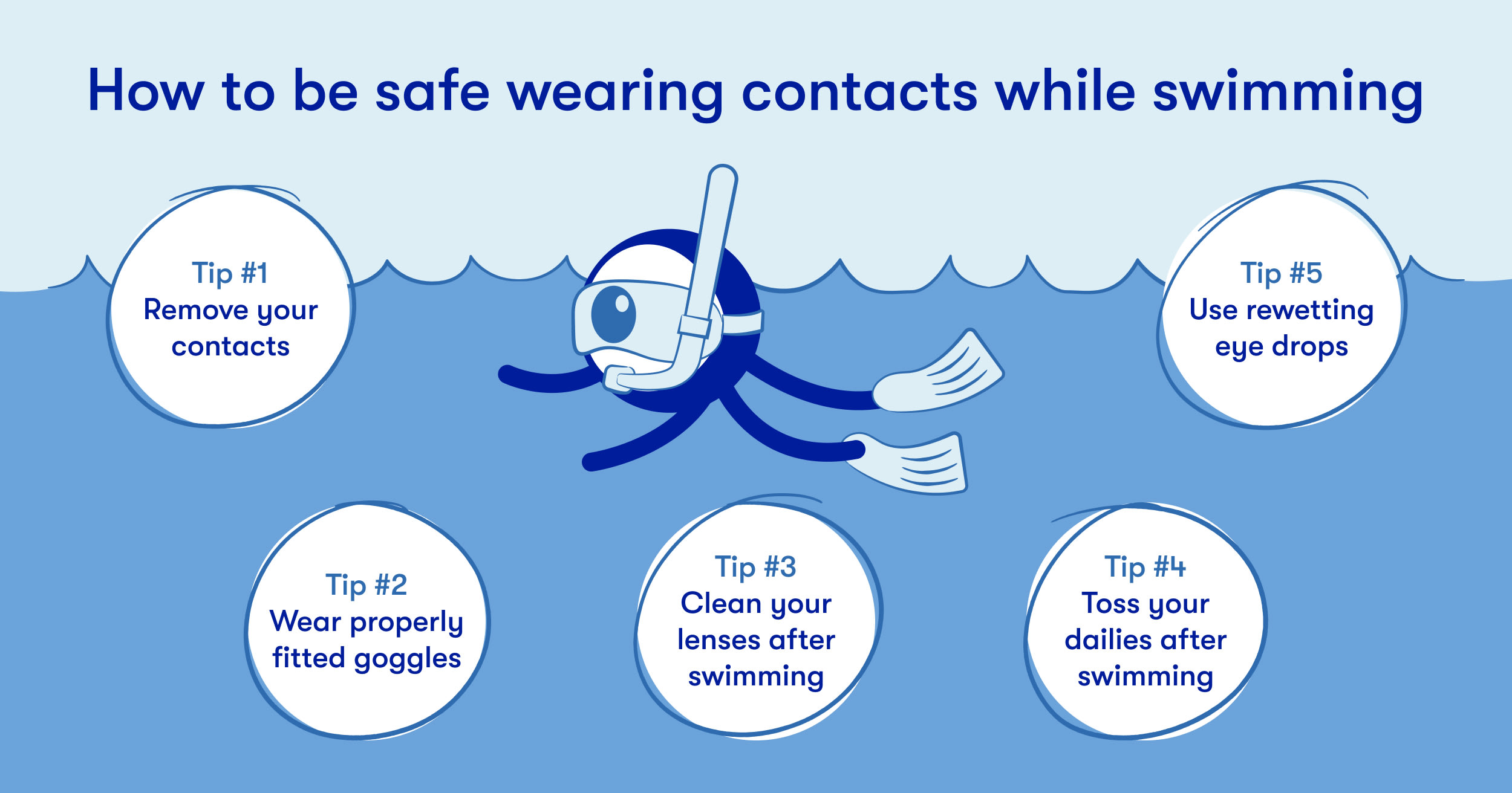Can I wear contacts in water?
Contact lenses, solutions, and drops all contain water, but they're all slightly different. Think of them like your favorite soft drink. Sure, soda has water in it, but you wouldn't drink three cans a day and tell everyone you're staying hydrated.
Tap water contains minerals and other impurities that make it unsuitable for contact lenses. For example, it's common for amoebae to get into the municipal water supply. These single-celled organisms can make their way into your eyes, causing an infection known as acanthamoeba keratitis. (You already have two eyes — what's that saying about three's a crowd?)
Unless you want amoebae, heavy metals, or harmful bacteria floating in your eyes, it's best to keep water away from your contacts. In this article, we give you the skinny on contact lenses and water. Find out what to do in all kinds of showering and swimming situations, from taking a dip in a chlorinated pool to ducking under a rainfall showerhead.

Order Contact Lenses Online
Learn how to order contact lenses online at 1-800 Contacts
Order contacts
What happens if you put contacts in water?
If you put your contacts in water, you might damage the lenses. Although soft contacts are durable enough for everyday wear, water can cause them to change shape. This makes them more prone to tearing.
As soft contacts change shape, they also swell, so they're more likely to stick to your eyeballs. If this happens, you can develop a corneal abrasion, a scratch on the part of the eye that helps focus light on the retina. Water can also irritate your eyes, causing redness and pain.
Remember what we said about getting amoebae in your eyes? They're not the only creatures that live in water. If you use water to clean your contacts, you can easily pick up a bacterial or viral eye infection.
So, can you wear contacts in the pool, put them in water, or use water instead of contact lens solution? We highly caution against it!
Can you wash contact lenses with water?
Absolutely not. Would you put a silk dress or a leather jacket in your washing machine? If not, why would you dunk your prescription lenses in tap water?
If you have hard water, tiny specks of calcium and magnesium can scratch your lenses or cause them to tear. In some places, tap water contains lead, arsenic and other hazardous substances. Worst-case scenario? You develop acanthamoeba keratitis, leading to permanent vision loss.
Mixing contacts and water isn't worth it, so don't wash your lenses in anything not made for this purpose.
Why you shouldn't shower with contacts
Just because the water is coming out of a showerhead instead of a sink doesn't make it any safer for your lenses. You can still get an eye infection or damage your lenses with microscopic pieces of soil, heavy metals, or minerals.
You might be thinking of your daily disposables and that these throw-away lenses are worth the risk. The same rules apply. Yes, daily disposables are only intended for a single day of use, but that doesn't mean they're immune to the harmful effects of tap water.
Wearing your contacts while showering can lead to:
-
Eye irritation
-
Redness
-
Light sensitivity
-
Vision changes
To avoid these issues, take a shower before inserting your lenses. If you need a shower after work, remove your contacts first.
What happens if you go swimming with contacts?
Now that you know what happens if you put contacts in water at home, let's explore what happens if you swim while wearing contacts. Expect the same things that can happen if you wash your lenses with water or wear your contacts in the shower: irritation, redness, lens damage and an increased risk of eye infections. Don't forget about the risk of corneal abrasions, either.
The risks are the same whether you dive into a chlorinated pool or spend time in the salty ocean. Pools and natural bodies of water contain bacteria, minerals, and other substances that can put your eyes in harm's way. (You're better off with a little blurry vision mid-swim than post-pool blindness.)
Can you wear contacts to a water park to get around these hazards? Getting splashed isn't quite as risky as dunking your whole head in water, but the answer is still no. You don't want a 2-minute ride on the log flume to be the reason you end up with an eye infection.
If you absolutely have to wear your contact lenses while swimming, these steps may reduce the risk of eye infections and lens damage.

Tip #1: Remove them
We know we sound like a broken record, but it's really best to remove your contacts before you go swimming or spend time at a water park. If you're still clinging to this idea more than contacts cling to an eye, read the next tips.
Tip #2: Wear goggles
Properly fitted goggles keep out water, so they can prevent harmful organisms from coming into contact with your eyes. They can also help you avoid lens damage. Contrary to popular belief, goggles fit properly when sealed well around your eyes. The strap has nothing to do with determining fit, and you can always adjust it if needed.
When you put on a pair of goggles, you should feel some suction when they meet the skin around your eyes. This suction doesn't hurt but lets you know a tight seal has formed.
Try on several pairs of goggles until you find one that fits comfortably and offers adequate protection. Spend a few minutes walking around the store to make sure you can see clearly with the goggles on. Finally, make sure you choose the right lens color.
Clear lenses are ideal for indoor use, making them suitable for swimming laps at your local YMCA. Smoke-colored lenses and mirrored lenses reduce brightness, so they're perfect for a day at the beach or the water park. If you plan to use the goggles indoors and outdoors, go with lilac, amber, or blue lenses.
Tip #3: Clean your lenses immediately after swimming
When you're done swimming, remove your contacts right away. Rinse them in multipurpose lens cleaner or another solution designed specifically for contact lenses. Then, soak them for about 6-8 hours. Cleaning your contacts thoroughly can help you avoid introducing bacteria, viruses, amoebae, and minerals into your eyes.
Tip #4: Toss your daily disposables after swimming
Because daily disposables are made to be used once and thrown away, you don't have to worry about cleaning them after a day of swimming and sunbathing. Simply toss them and insert a new pair. Alternatively, you can toss your daily disposables and wear glasses for the rest of the day.
Tip #5: Use rewetting drops before and after a swim
Rewetting drops remove debris from contact lenses, reducing the risk of irritation. They also moisten contacts, which may prevent dry eye or redness.

Order Contact Lenses Online
Learn how to order contact lenses online at 1-800 Contacts
Order contacts
No swimming with contact lenses
Contact lenses and water are two things that shouldn’t mix. There are numerous benefits of wearing contacts daily, but it also means you need to be aware of your eye health. Every contact lens wearer should know the extra steps it takes to wear contacts regularly: Take your contacts out before bed, don’t overwear them, and never wear them in water.
If you need to replace a pair of contacts after swimming or wearing them in the shower, 1-800 Contacts has a wide selection of daily disposables and extended-wear lenses. Browse our website to find the brand prescribed by your eye care professional.
Did you know you can order contacts online?
Say goodbye to trips to the eye doctor and hello to convenience! With 1-800 Contacts, you can easily order your contact lenses online and have them delivered straight to your door. Plus, our online vision exam makes it simple to get the prescription you need without leaving home. And the best part? You’ll save money on your first order with 1-800 Contacts. It’s never been easier to get your contacts!
Original publish date: 9/13/2021




